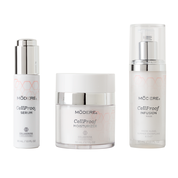
FigLeaf: When Privacy Is A Choice, Humanity Is Free
“The findings of this survey offer marketers and advertisers an opportunity to adjust to the changing privacy landscape and engage consumers in new and more authentic ways,” said Pankaj Srivastava, COO and CMO of FigLeaf.
SAN FRANCISCO (PRWEB)
September 24, 2019
As the debate rages over consumer online privacy, FigLeaf, a privacy-first company, surveyed US and UK consumers and discovered an underlying opportunity for those hit hardest by ever-increasing privacy demands: marketers and advertisers. Despite the fact that 68% of consumers do not believe online privacy is possible and 52% do not trust recent commitments made by Facebook or Google around stricter privacy protection, the survey revealed consumers are still open to sharing information with brands they trust. Banks ranked highest in trust factor for all respondents, with government entities second. Perhaps unsurprisingly, social media sites like Facebook ranked dead last in trust, with mobile operators faring only slightly better – a particularly telling insight for brands and advertisers when considering the best medium for reaching their consumers.
Survey results also highlighted key differences in individuals’ privacy preferences based on gender and age, creating an opportunity for marketers to more closely align messaging to key demographics.
“The findings of this survey offer marketers and advertisers an opportunity to adjust to the changing privacy landscape and engage consumers in new and more authentic ways,” said Pankaj Srivastava, COO and CMO of FigLeaf. “Consumers have voiced the fact they are not unwilling to share personal data. They simply want greater insight into how that data is used, and they want more choice and control over when they share personal information and with whom. Brands that comply with these wishes, and demonstrate a willingness to respect and protect the individual’s personal information, will be rewarded with deeper engagement and lasting loyalty.”
Gender
Men and women paralleled each other on their reactions to recent data scandals, with more than three-quarters of both men and women saying they have changed the way they behave online. Gender responses also matched in the knowledge of where their personal data exists online, with 28% of women and 29% of men saying they are confident they know every company and website who has access to – or is storing – their online data.
The sexes differ in online privacy however, in what they are willing to share and how they address privacy concerns. For example, 48% percent of women are worried about sharing their location or having it tracked compared to only 37% of men. To address privacy concerns, women are more apt to share less online (68%) as compared to men (54%), while one in 10 men use a Virtual Private Network (VPN) as compared to only 7% of women who do.
Age
When asked who should be responsible for an individual’s privacy, 45% of US respondents agreed it should be a joint effort between the individual, the companies collecting the data, and government regulators. However, when broken down by age, 28% of respondents over 30 years old placed the responsibility squarely on the shoulders of companies, while only 15% under 30 were inclined to agree. Those under 30 showed more inclination to take matters into their own hands, with 58% choosing to use privacy tools, deleting social media accounts or restricting what they share online, as compared to the 30% of respondents over 60 who believed the best solution to protect personal, digital information was for government to create stricter laws.
The younger generation was slightly more bullish on privacy legislation, with 12% saying the advent of the European Union’s General Data Protection Regulation (GDPR) afforded them greater choice over which sites can access their personal information, compared with only 6% of those over 45. The under 45 demographic was also nearly twice as likely to believe total online privacy is possible, compared to their older counterparts.
Overall, respondents under 45 showed a marked optimism for the future of online privacy. One in five felt confident they knew everywhere their information was used or stored online, as compared to only 10% of those over the age of 45. And, while younger respondents recognized their activities were being tracked online, only 11% thought companies were taking advantage of all the information they could access. The under-45 demographic was also nearly twice as likely to believe total online privacy is possible, compared to their older counterparts.
Among all respondents to the survey, 62% believe a privacy tool or cybersecurity measure is the best way to stay safe online, demonstrating a desire to have greater control over their own data. This option proved more effective than restricting online activity (32%), deleting social media (16%), or demanding stricter penalties for companies that violate privacy (38%).
Conducted in May 2019, the survey queried over 4,000 male and female online consumers aged 18 or older across the US and the UK. A FigLeaf press kit including, charts and graphs, logos and other assets can be accessed here.
About FigLeaf
FigLeaf Inc. is a privacy-first company that offers consumers the choice of total digital privacy across all devices, anywhere and anytime. Our comprehensive, easy-to-use privacy solution allows consumers to control their own data, image, reputation and identity online. FigLeaf empowers individuals with the choice for total digital privacy, helping them understand what and where data has been exposed, and providing tools to securely share information in the manner they choose. Available on Mac, Windows, iOS and Android, FigLeaf’s “Privacy by Design” approach gathers only the information a consumer chooses to share. Our proprietary “zero-knowledge” solution architecture ensures only the individual consumer holds the key to their identity and no outside party can access their personal information – not even FigLeaf.
Founded in 2018, FigLeaf is a privately held company with offices in Silicon Valley, London, Kiev and Nicosia, Cyprus. Follow FigLeaf on Facebook, Twitter, Instagram and LinkedIn, or visit us at https://figleaf.com to learn more. FigLeaf: when privacy is a choice, humanity is free.
All trademarks contained herein are the property of their respective owners.
















